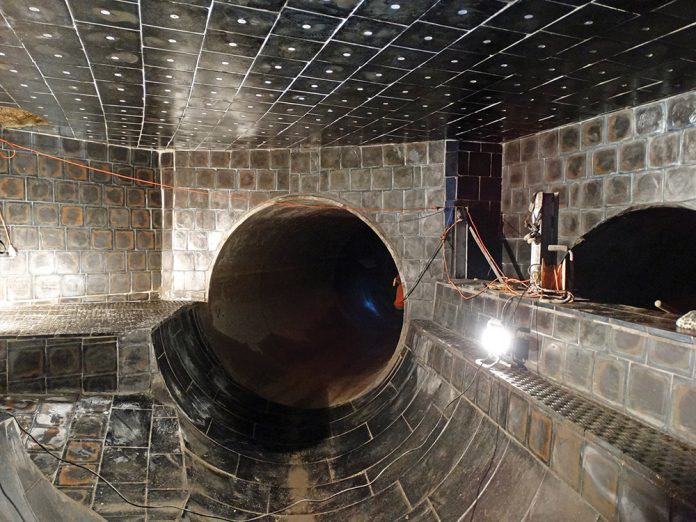Specialist UK-based engineering firm Greenbank Group is set to lead a revolution in the repair and restoration of the nation’s sewer systems, incorporating the unique properties of cast basalt.
The technique is new to the UK but Greenbank’s Czech partner company Eutit has been successfully deploying basalt in the sewer system serving capital city Prague since 1996, when a catastrophic sewer collapse was repaired using cast basalt produced from the locally-sourced volcanic rock.
Greenbank Managing Director Charles Conroy explained: “Cast basalt provides a revolutionary lining with unrivalled resistance to wear, degradation from water jet cleaning and corrosive attack from chemicals.”
Basalt also has other advantages over more traditional brick and concrete, said Mr Conroy: “This unique material guarantees increased flow rates and reduced maintenance costs and provides additional protection on locations prone to wear, blockage or failure.
“What’s more, the effective life expectancy of basalt sewer lining systems is between 100 and 200 years, depending on the application, thanks to their resistance to abrasion and chemicals commonly used in the industry.”
Thanks to its partnership with Eutit, Greenbank can now provide a wide range of basalt products for implementation in all sewage disposal systems and drainage projects in the UK.
Products available through Greenbank include bottom gutters, branch pipes and tubes, and slip-resistant flooring for walkways. The company can even supply bespoke shaped tiles to meet the unique requirements of individual clients.
Parts of Prague’s sewage system date back to 1907 but cast-basalt first began to provide the ideal solution to its dated technology in 1996, when a whole section of the sewer suffered a catastrophic failure as large sink holes had created a 10-metre-long cavern. Along with a completely new header structure, cast basalt gutter segments were deployed at the bottom and sides of the sewer and cast basalt interlocking side panels were tied to surrounding rock with anchor bolts.
Cast basalt was also used in the areas where damage was mainly confined to the bottom part of the header, where existing masonry was underpinned alongside the installation of an entirely new bottom section.
In the 1996 works, the section of the header with the 100/175cm flow profile and the highest gradient between 5 and 9.8 per cent was renovated using the sewer-in-sewer technology. This consists of lining the existing sewer with cast basalt gutters and segments that are interlocked across the entire flow profile.
The space between the basalt liners and the existing sewer construction was designed to be back-filled with concrete, whilst the roof was filled with shotcrete. Although this technology decreased the flow profile, it was selected due to its hydraulic conveying benefits.
Then in 2002, devastating floods forced the adoption of a dynamic solution to renewing Prague’s outdated sewer system, allowing the city to meet the needs of a vibrant 21st-century European capital. With cast basalt having already proved its worth, the material was seen to have all the qualities needed to provide long-term reliability in these extreme environments.
Mr Conroy said: “In Prague and other Central European cities, basalt tiles are already being used to line existing brickwork, a more cost-effective solution than full replacement, and their reduced drag co-efficient means improved flow. In effect, a smaller-diameter pipe or tunnel lined with basalt can carry a higher volume of water than a larger one with traditional brick or concrete pipes and sluiceways surfaces.
“Nearly 25 years after the 1996 collapse, the benefits of using basalt in the repair and refurbishment of sewer systems are becoming increasingly clear, and the material has already been tried and tested in some of the most demanding heavy industries.
“Prague’s residents now have the benefit of one of the world’s most reliable sewer systems thanks to the unique qualities of its revolutionary basalt lining. Now Greenbank Group can deliver the same benefits to UK towns and cities.”
www.greenbankgroup.com



